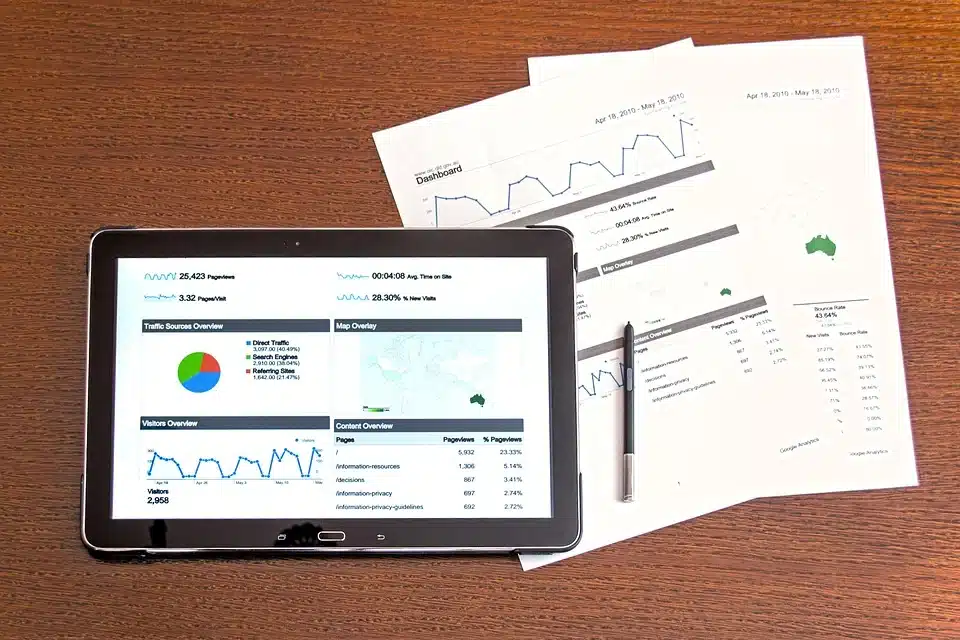Listen to this blog
With the combination of M.Sc. in Business Analytics curriculum, students will gain a deeper understanding of general business fundamentals such as global issues and macroeconomics, leadership development, and more specialised subjects such as business analytics programming, machine learning, decision analytics, data analytics, etc. This degree programme develops executives in such a way that they can quickly switch between data analysis and strategic decision-making.
Why is Business Analytics important?
Business analytics is the process of gathering, integrating, sorting, analysing, and transforming data into business insights using statistical models and approaches. It aids in deciding which datasets are relevant and how you may use them to address issues and boost production, efficiency, and income. The business analytics process involves using statistical tools such as measurements of central tendency, graphs, and so on. It also entails the management of information system software such as data mining and sorting processes. The sector is also concerned with the application of operations research methodology. The industry is concerned with identifying, visualising, and disseminating patterns or trends in datasets. Given the significance of business analytics, it may be characterised as a technique that begins with collecting business-related data and includes the sequential application of descriptive, predictive, and prescriptive primary analytic components. It aids in corporate decision-making and improves organisational effectiveness. Business analytics is all word for two distinct domains of practice:
- Business Intelligence
- Advanced Analytics
Business intelligence (BI): Business Intelligence is often descriptive, focused on the tools and tactics used to locate, gather, and analyse raw data about past or present occurrences. It is the practice of analysing historical data to determine how a product line or department within a company fared during a given period. Querying, reporting, and online analytical processing are examples of Business Intelligence practices.
Advanced analytics: It is a relatively recent development that entails in-depth statistical analysis, such as predictive analytics performed by applying statistical algorithms to historical data. It aids in forecasting how new services or products will affect sales. Advanced analytics approaches include cluster analysis, data mining, and simulation algorithms.
The purpose of an M.Sc. in Business Analytics
M.Sc. Business Analytics has a wide scope in several applications, and below are some details:
- You may use it for descriptive analysis, which uses the information to comprehend the past and present condition.
- It is utilised for predictive analysis, typically used to assess historical company execution.
- It is also used for prescriptive analysis, which aids in developing advanced systems for better company performance.
Business analytics is relevant in every sector because it gives real-time solutions to challenges. This field is important and serves as a springboard for a dream job. With the introduction and integration of the internet into every area, data analytics has become a foundation that accelerates growth in every organisation and industry.
The Business Analytics programme is open to professionals with a bachelor’s degree in any area with Statistics as a subject. Work experience is desirable to apply for M.Sc. in Business Analytics.
Career growth after M.Sc. in Business Analytics
Reputable organisations hire market analysts based on their expertise, ability, and experience. According to McKinsey’s survey, 58 per cent of respondents at top-performing firms had strong functional knowledge in data engineering, data science, data architecture, and analytical transformation.
M.Sc. graduates in Business Analytics can find work in various industries such as information technology, healthcare, financial institutions, e-commerce, and so on. Some of India’s top recruiters for Business Analytics specialists are Boston Consulting Group, Accenture, Capgemini, Wipro, and Amazon. Here is a list of a few top careers and employment opportunities available after completing an M.Sc. in Business Analytics India:
1. Data Scientist
A data scientist is a subject matter expert in the field of data. During their job, they employ scientific, mathematical, and technical approaches to collect, structure and categorise the data, applying various methods to acquire insightful data, and using the insights to generate forecasts and reports. As a data scientist, you can expect to earn between INR 4 lakhs and INR 8 lakhs.
2. Business Analyst
Business analysts thoroughly examine every area of a company, and they must be completely knowledgeable about the company and its operations. A business analyst must analyse everything and give insightful knowledge on improving the firm, including marketing, advertising, accounting, finance, procurement, supply chain, and distribution. A business analyst’s income ranges from INR 4 lakhs to INR 7.5 lakhs.
3. Information Technology Analyst
An IT analyst is a computer professional who manages an organisation’s IT infrastructure. IT analysts are some of the most significant professionals responsible for organisational efficiency and performance, from maintaining the systems to developing the infrastructure. IT analysts can enhance existing systems or build whole new ones. They must also oversee the company’s IT operations. IT analysts may earn anything from INR 2 lakhs to INR 12 lakhs.
4. Quantitative Analyst
A quantitative analyst must be well-versed in mathematical and statistical data collecting, collation, and interpretation methodologies. Their primary responsibilities are around finances and risk management. They give meaningful data to many organisations and professions, mostly those involved in investing. Findings are typically correct since their approaches are primarily based on hard facts. This is a very profitable career, with salaries ranging from INR 5 lakhs to INR 15 lakhs.
5. Project Manager
A project manager is assigned to any assignment in a corporation, although there are professional project managers whose primary responsibility is to oversee projects. Because this role is all about project management, their primary responsibility is to evaluate and analyse the task at hand, seek insights, and distribute tasks to team members accordingly. They must also guarantee that the team members are motivated and working correctly and that the project is completed on schedule. Project managers income ranges from INR 4 lakhs to INR 8 lakhs on average.
6. Business Data Analyst
The primary responsibility of a data analyst is to collect and analyse data for the benefit of the organisation’s business. They are professionals in data collection using various ways. They also establish collecting data and guidelines for organising and quantifying that data. Following the study, they deliver informative findings and recommendations to the organisation to improve its profitability. Data business analysts earn between INR 4 lakhs and INR 12 lakhs per year.
7. Analytics Manager
Analytics managers are responsible for organising an organisation’s analytics operation. They must design strategies and manage the execution to achieve effective data reporting, gathering, and analysis. They must also evaluate their analytics solutions regularly and, if necessary, improve or replace the systems. Analytics managers are paid between INR 10 lakhs and INR 20 lakhs.
8. Data Architect
A data architect is an individual in charge of an organisation’s data infrastructure. Data architects conceive, design, and manage the whole data architecture. They must blend creativity with technical expertise because they are in charge of deciding how data will be collected, stored, categorised, and managed within an organisational framework. Data architects are finding work in various businesses as the value of big data grows. As a result, their wages range from INR 4 lakhs to INR 25 lakhs.
9. Technology Analyst
Companies that rely on technology to function require the skills of a technology analyst. They thoroughly examine the company’s operational technology and must make changes to that technology. This might be a technological upgrade or a full renovation. They must also consider the time and money required. This is a highly specialised role that necessitates extensive technical expertise on the part of the candidate. Their average pay ranges from INR 6.5 lakhs to INR 9 lakhs.
Skills necessary to become a business analyst
According to the GMAC Corporate Recruiters Survey 2019, more than half of recruiters consider data analysis and interpretation abilities as important as problem-solving and collaborating with others. According to LinkedIn research, firms will need analytical thinking, business analysis, and data science capabilities in 2019. The following abilities are necessary to pursue a career in business analytics:
- Communication abilities
- Technical Capabilities
- Management Capabilities
- Ability to Make Decisions
- Ability to Analyse
- Critical thinking abilities
- Negotiation Capabilities
Salary and employment statistics for M.Sc. Business Analytics
According to LinkedIn statistics, a data scientist job position is rated first among the most promising careers of 2019, with a typical base pay of USD 130,000 in the United States. As per payscale.com, the average base salary of Business Analyst in India is INR 612,281.
Earn an online M.Sc. Business Analytics degree from Online Manipal
The prestigious Manipal Academy of Higher Education (MAHE) is now offering an online M.Sc. in Business Analytics degree through Online Manipal platform. This online degree programme from MAHE, an Institute of Eminence, is a cutting-edge programme to build future-ready talents in the Business Analytics domain. You can enrol and pursue the course from the comfort of your home without putting an halt to your work or other commitments. The entire learning material is available on the state-of-the-art learning management system, that can be accessed using any device even in the low bandwidth internet.
Conclusion
A degree in Business Analytics is a rewarding professional option. M.Sc. in Business Analytics degrees are in high demand, and some of the well-known companies looking for business analytics expertise include McKinsey & Company, KPMG, Morgan Stanley, Infosys, Boston Consulting Group, Wipro, Microsoft, Adani Group, Tata Group, Facebook, Google, Capital IQ, Linkedin, American Express and many more. With a proper training by expert faculties
Become future-ready with our online M.Sc. in Business Analytics program







